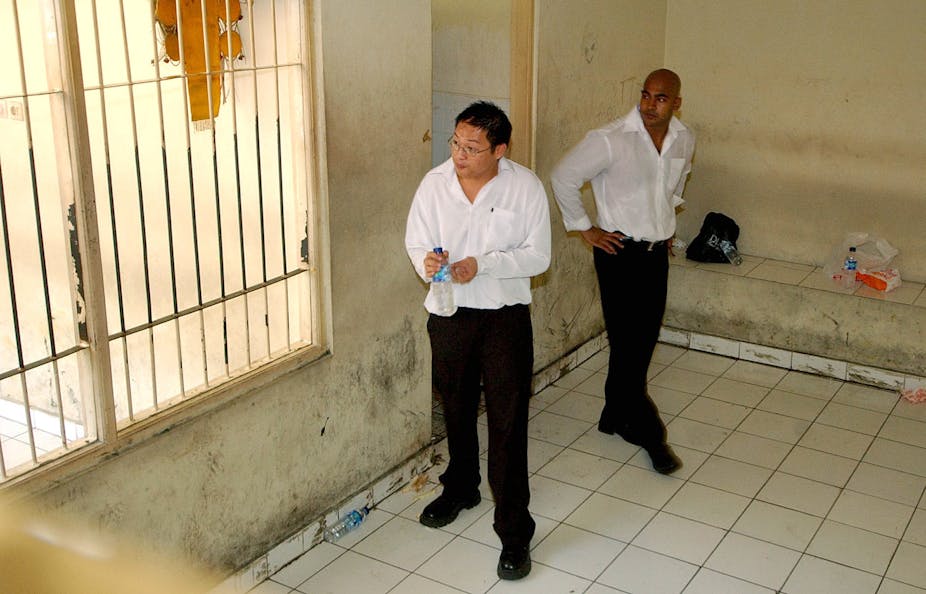The issue of the death penalty for drug offenders is receiving a lot of media attention as Indonesia executed convicted drug traffickers last month and plans more in coming weeks.
Two members of the Bali Nine drug ring, Australians Andrew Chan and Myuran Sukumaran, are among those on death row. Indonesian President Joko Widodo, popularly known as Jokowi, has rejected their clemency requests.
Analysts say Indonesians overwhelmingly support the death penalty for serious offences despite a lack of evidence that it deters crime.
The way most Indonesian media outlets frame the issue plays a part in shaping this public support. Coverage of the death penalty reinforces a myth that it serves as a panacea for a social illness.
The domestic politics of capital punishment
Indonesians view Jokowi’s move as a decisive act against a serious crime. But it is important to understand the political context of his execution orders.
Jokowi faces challenges in domestic politics. Aside from the issue of the death penalty, local media outlets are focused on a rift between two law-enforcement institutions, the Indonesian police (Polri) and the Corruption Eradication Commission (KPK).
The KPK versus Polri saga reflects badly on Jokowi’s image as a decisive leader. Around the time he approved the first executions of drug offenders, he also nominated a KPK graft suspect as the sole candidate for police chief. Responding to the KPK’s allegations against their police chief candidate, the police named a KPK commissioner as a graft suspect. This was widely seen by the public as a move to weaken the corruption commission.
These developments mean law enforcement and the strength of Jokowi’s leadership are hot topics for the Indonesian media. As a new president in the middle of a rift between two national institutions, ordering executions for drug traffickers offered a perfect way to look decisive.
Media frame views on death penalty
Local media outlets have reported more on the rift between KPK and Polri than on the death penalty for drug offenders. Between January 15 and February 4, Kompas.com ran 135 news reports on the death penalty. The site published 200 news reports on the KPK-Polri conflict in a shorter period from January 28 to February 4.
Another popular site, Detik.com, published 184 news items on the death penalty and 1070 on the KPK-Polri controversy in a one-month period (January 4 to February 4).
Within the space provided for the death penalty issue, the media filled its coverage with quotes from public officials. Jokowi was widely quoted as saying that the executions were in line with Indonesian law. The reports also quoted Jokowi’s claim of a national drug “emergency” based on dubious statistics.
In contrast with the media’s coverage of the government’s argument for the death penalty, few reports have examined whether capital punishment is an effective deterrent. Indonesian media have quoted celebrities, religious organisations and even academics, thereby reinforcing the myth without scientific evidence.
Media reports on the issue of efficiency of this penalty are also very few. The one news report on the high costs of executions did not ignite any public debate.
The media coverage frames the death penalty for drug offenders through legal arguments in support of capital punishment. Within this frame, opposing arguments, either based on human rights grounds, political agendas or lack of evidence for crime deterrence, cannot dispel the myths attached to the death penalty.
In social media, many people express their support for the death penalty by arguing for Indonesia’s sovereignty. Activists who argue against the death penalty, as well as the media that provide space for their views, are seen as Western henchmen, insensitive to drug victims.
Framing a pro-abolition message
A group of media researchers from Pennsylvania State University led by Frank E. Dardis proposed a new way of framing the issue that might change the way the public view the death penalty.
Instead of covering the normative angle, the media should examine the conditions of the judicial system. It is very likely that some convicts receive their sentences through an unfair trial in Indonesia’s corrupted system.
This strategy can only work by changing public opinion in the long term. The problem is whether media in Indonesia are willing to shift their current preference on capital punishment.
With the structure of media ownership in Indonesia entangled with political interests, political agendas will mostly run the show.

